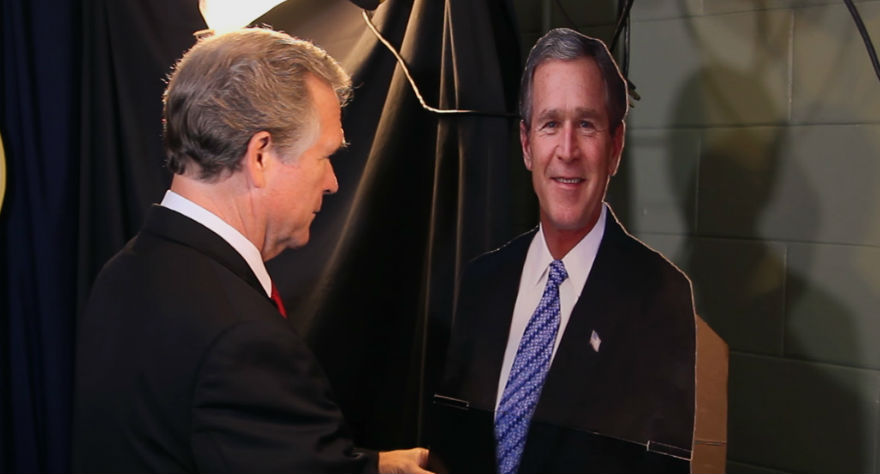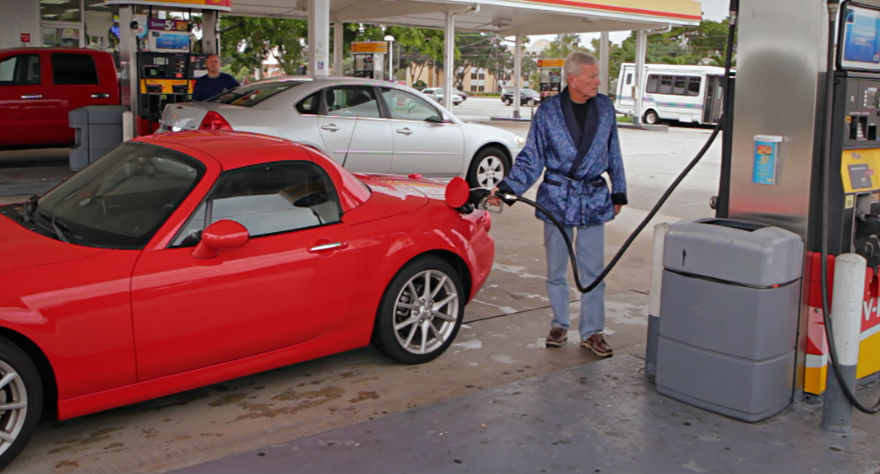Matt Mamula & Jason Kovacsev Talk ‘Just About Famous’, The Lives of Celebrity Impersonators

Matt Mamula and Jason Kovacsev are a couple of independent filmmakers out of Florida who, through their documentaries, have examined the lives of people with unusual jobs and hobbies you’ve probably never heard of. From a man who built his own Egyptian coffin (Die Like an Egyptian), to a group of recovering addicts who run a car wash (Wash for Change), to a badass female football team (Gridiron Girls), they’re shining a light on everyday, hard-working people who happen to be passionate about some very, very unique things.
Their latest documentary, Just About Famous, gives us a behind-the-scenes look into the lives of celebrity impersonators, whose small-but-passionate community of followers worship them as if they were the real deal. And they are the real deal, if you look at them from the right perspective: they’re performers, experts at their craft who have no delusions about who they are as people. The film follows impersonators of Hugh Hefner, Lady Gaga, George W. Bush, and Bill Clinton (among others) as they work on their routine, make appearances at various functions and events, and put smiles on people’s faces.
I had the pleasure of speaking with Matt and Jason about the film, which is available tomorrow, April 21st, on iTunes, Google Play, Vimeo On Demand, VUDU, and justaboutfamous.com

It must have been a blast to shoot this thing.
Matt: Yeah, it was definitely very fun making it. Being around [the impersonators] is a trip. It’s kind of crazy the way people react to them.
You’re filming stuff like a Lady Gaga impersonator shooting fire out of her bra. Was it bizarre?
Jason: The whole process is actually quite bizarre, to be honest with you. Shooting, hanging out with them during promotion of the film…sometimes these people generate a lot of pandemonium. When we were promoting the film at a festival in Cleveland, we walked through a casino and basically almost got arrested because our Hugh Hefner impersonator caused such a ruckus. The cops said we had to leave or they’d take us to jail. That kind of stuff happened pretty consistently, even during filming. It was crazy.
I think the notion that celebrity is too big for one person to carry the load is fascinating. There’s demand for other people to assume the identity of these celebrities.
Jason: One of the interests for us in doing a film like this was that idea that celebrity is so big that regular people who happen to look like these famous people generate so much interest. You see all these people falling all over each other to get a picture or a hug, and Matt and I look at each other and say, “Why are they excited to see George?” Sometimes they don’t care [that it’s not the real person]. They just want to be around these people.
If I’m being honest, my feeling about celebrity impersonators going into the film was that they make me uncomfortable. I get kinda creeped out. What was your impression of them before starting this project?
Matt: I think we were on the same line as everyone else. We thought they were these people who dress as celebrities and think they’re them. We really didn’t know what to think, but once we started shooting and being around them, we started seeing their process, and we got caught up in the ones that were really good. You want to be around them. You get excited.
Jason: You get this impression that they’re oddballs, a little bit nuts. Some of them are. But most of the ones that we had in the film are extremely grounded people, very normal. They recognize how bizarre it all is, but it’s something they’re able to have fun with and make good money off of. That initial impression of them being odd individuals went away after we started being around them. The film dispels the idea that they’re a bunch of nuts and flakes.
Matt: They’re very protective of themselves because people mock them and don’t take them seriously. When we were trying to get the documentary going, they had to make sure we weren’t going to mock them in the film. Fortunately we were able to get past that hurdle and they let us in. It was wide open at that point.
When you see a real celebrity, they’re typically trying to duck away or hide from the fans because it’s all really overwhelming. These impersonators welcome the attention and the excitement, which is a strange thing to see. It’s like being in bizarre-o world.
Jason: I one hundred percent agree. They seem to really seek out the attention. I’ve never seen one of them turn down a photo request. They love it. And they have a lot of respect for the celebrities; they know they’re making money off of their likeness, and they don’t want to disparage them, at least knowingly. They have this strange obligation to the celebrity to not paint them in a bad light, so they’re always available for pictures and hugs.
Matt: The big difference between them and the celebrities is that the celebrities have the big entourages and security. The impersonators don’t have the ability to walk away, so they kind of get stuck [in the middle of the fans].
Jason: We were supporting the film at a festival, and we took our Hugh Hefner impersonator, who’s one of the “dead ringers”, as you would call them. This night club went insane. I think rhyme and reason kind of goes out the window. He was wearing this kind of costume robe that said Playboy on the back, he had me as security [laughs], and the place went crazy. The bouncers were helping us get through the crowd, and I thought they knew that this wasn’t actually Hugh Hefner. At the very end when they got us to the back alley away from the people, they asked to take a picture with him! How did they not know? [laughs]
One thing I found interesting was the idea that, at an advanced age, some of these people can start a brand new career for themselves impersonating celebrities. The Hugh Hefner impersonator, for example, simply couldn’t have done this job when he was younger. I thought that was very cool.
Jason: You’re right. It sometimes just depends on when that likeness lands, which can be at any age.
Matt: Sometimes it’s also the timing of when a celebrity gets bigger and comes on the scene. All of a sudden, people start saying, “You know who you look like?”, and then they’re making money off it.
The movie’s really funny. One of my favorite scenes is when Bush is singing a song to Clinton over Skype.
Matt: I think we tried to emulate the feeling we get when we’re around them, which is a feeling of fun. I think that’s why we used the mariachi music, because it kinda had that same spirit. The feeling we got around them translated to keeping this fast pace and comedic tone in the film.
Jason: At first, we didn’t know we were going to make this kind of movie. We thought we’d do this sort of comment on celebrity in this country, which didn’t really happen. When we watch this movie with audiences, they laugh out loud several times. Documentaries aren’t really known to be comedies. Not that there aren’t quirky, funny documentaries, but this one really gets laughs like a mainstream comedy. People love seeing the impersonators, too. They get very passionate about whether they look like the real celebrities or not.
What drives you to find these people, who have these unusual jobs and hobbies, and tell their stories with your films?
Jason: Honestly, some of it is practical. We find stories that are close by. One of our films is about a full-contact female football team, and they’re here in our hometown of Orlando. The impersonator convention takes place here as well. So far, they’ve been local stories we’ve been fortunate enough to find and put a little bit of the spotlight on. We hope to expand to more national stories eventually, but we’re fortunate to have found these people.
Matt: It’s also about curiosity. I didn’t know much about the celebrity impersonators or the female football players, but we learned about their worlds as we made the films.
